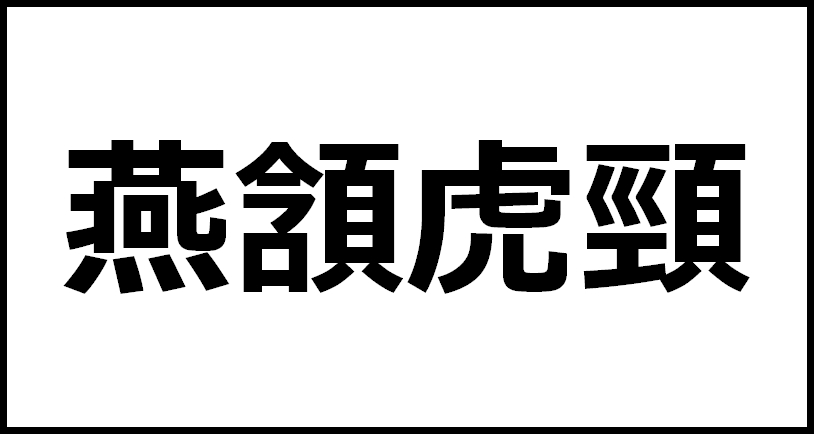燕頷虎頸について。四字熟語の燕頷虎頸の読み方や意味、英語や外国語での意味をまとめました。
燕頷虎頸について
燕頷虎頸の読み方・意味
| 四字熟語 | 燕頷虎頸 |
| 読み方 | えんがんこけい |
| カタカナ読み | エンガンコケイ |
| ローマ字読み | engankokei |
| 読みの文字数 | 7文字読みの四字熟語 |
| 頭文字 | 「え」から始まる四字熟語 |
| 構成する文字 | ・燕 ・虎 ・頷 ・頸 |
| 意味 | 武勇に秀でた、勇ましい武者の容姿のたとえ。または、遠い国の諸侯となる人の容姿のたとえ。燕のような顎と、虎のように太い首のことで、武勇に秀でた人物の骨相をいう。後漢の班超は筆書の仕事をしていたが、武功を上げたいと占い師に聞くと、遠い地域で諸侯になる人相だと言われ、万里の長城の外で武功を上げ、定遠侯に封じられたという故事から。 |
燕頷虎頸の意味(外国語)
燕頷虎頸の外国語での意味をまとめました。
| 英語 | A parable of the appearance of a brave warrior who excelled in martial prowess. Or, a parable of the appearance of a person who becomes a feudal lord of a distant country. With jaws like swallows and thick necks like tigers, it refers to the skeleton of a person who excelled in military prowess. In the Later Han dynasty, Ban Chao was a calligrapher, but when he asked a fortune teller that he wanted to improve his military exploits, he was told that he had the appearance of becoming a feudal lord in a distant region. From the historical fact that it was sealed in. |
| スペイン語 | Una parábola de la aparición de un valiente guerrero que sobresalió en destreza marcial. O bien, una parábola de la aparición de una persona que se convierte en señor feudal de un país lejano. Con mandíbulas como golondrinas y cuellos gruesos como tigres, se refiere al esqueleto de una persona que se destacó en destreza militar. En la dinastía Han posterior, Ban Chao era calígrafo, pero cuando le preguntó a un adivino que quería mejorar sus hazañas militares, le dijeron que tenía la apariencia de convertirse en un señor feudal en una región lejana. que estaba sellado. |
| イタリア語 | Una parabola dell’aspetto di un coraggioso guerriero che eccelleva nell’abilità marziale. Oppure, una parabola dell’aspetto di una persona che diventa feudatario di un paese lontano. Con mascelle come rondini e colli spessi come tigri, si riferisce allo scheletro di una persona che eccelleva nel valore militare. Nella tarda dinastia Han, Ban Chao era un calligrafo, ma quando chiese a un indovino che voleva migliorare le sue imprese militari, gli fu detto che aveva l’aspetto di diventare un signore feudale in una regione lontana. che era sigillato. |
| ポルトガル語 | Uma parábola do aparecimento de um bravo guerreiro que se destacou em proezas marciais. Ou, uma parábola do aparecimento de uma pessoa que se torna um senhor feudal de um país distante. Com mandíbulas como andorinhas e pescoços grossos como tigres, refere-se ao esqueleto de uma pessoa que se destacou em proezas militares. Na dinastia Han Posterior, Ban Chao era calígrafo, mas quando perguntou a uma cartomante que queria melhorar suas façanhas militares, foi-lhe dito que tinha a aparência de se tornar um senhor feudal em uma região distante. que foi selado. |
| フランス語 | Une parabole de l’apparition d’un brave guerrier qui excellait dans les prouesses martiales. Ou, une parabole de l’apparition d’une personne qui devient un seigneur féodal d’un pays lointain. Avec des mâchoires comme des hirondelles et des cous épais comme des tigres, il fait référence au squelette d’une personne qui excellait dans les prouesses militaires. Sous la dynastie des Han postérieurs, Ban Chao était calligraphe, mais lorsqu’il a demandé à une diseuse de bonne aventure qu’il souhaitait améliorer ses exploits militaires, on lui a dit qu’il avait l’apparence de devenir un seigneur féodal dans une région lointaine. qu’il était scellé. |
| 中国語 | 比喻武功高强的勇士出现的寓言。 或者,成为远方领主的人出现的比喻。 下颚如燕,颈粗如虎,指的是武功高强的人的骨骼。 后汉时期,班超是书法家,但当他问算命先生想提高自己的战功时,被告知他有成为远方诸侯的模样。从史实看它被密封在里面。 |
| 韓国語 | 무용에 뛰어난 용감한 무자의 외모의 비유. 또는 먼 나라의 제후가 되는 사람의 외모의 비유. 삼기와 같은 턱과 호랑이처럼 두꺼운 목으로 무용에 뛰어난 인물의 골상을 말한다. 후한의 반초는 필서의 일을 하고 있었지만, 무공을 올리고 싶다고 점쟁이에게 들으면, 먼 지역에서 제후가 되는 인상이라고 말해져, 만리의 장성 밖에서 무공을 올려, 정원후 에 봉쇄되었다고 하는 고사로부터. |


